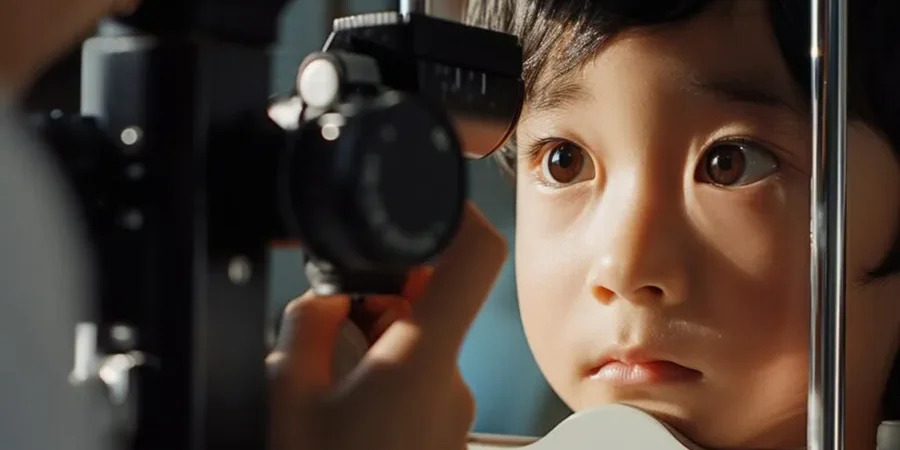Children with special needs often face unique health challenges, and vision problems can be one of the most overlooked. Their eye care requires more than standard examinations—it demands compassion, expertise, and a tailored approach. For parents seeking the best for their child, understanding how the best eye hospital supports children with special needs can bring comfort and confidence.
1. Understanding the Visual Needs of Special Needs Children
Children with developmental delays, autism spectrum disorders, Down syndrome, or cerebral palsy may have underlying vision issues that are not always easy to detect. These children might struggle to express discomfort or describe what they see.
A pediatric eye specialist is trained to recognize subtle signs of visual impairment, even in non-verbal or sensory-sensitive children. The goal is not just to assess eyesight but to understand how vision impacts the child’s daily experiences.
The best pediatric eye specialists adopt a holistic view of each child’s visual and developmental condition. Their experience in working with diverse cases makes early detection and treatment more accessible and effective.
2. Why Specialized Pediatric Eye Care Matters
Unlike general ophthalmology, pediatric eye care requires deep understanding of childhood eye development. When a child also has special needs, the complexity of care increases.
The best eye hospital ensures that its pediatric team includes professionals who are not only medically skilled but also empathetic and patient. They create a calm, child-friendly environment that helps children feel secure.
From gentle communication to non-invasive examination techniques, every step is designed with the child’s comfort in mind. This builds trust and allows accurate assessments without causing distress.
3. Customized Eye Exams for Unique Challenges
Standard vision tests may not work well for children with cognitive or physical limitations. Pediatric eye specialists often use alternative tools like preferential looking tests, picture charts, and objective tests to evaluate vision accurately.
For children who cannot sit still or follow verbal instructions, techniques such as hand-held equipment or mobile diagnostic tools are used. These allow the examination to be flexible and stress-free.
In the best eye hospital settings, exam rooms are thoughtfully arranged to reduce sensory overload. Lighting, noise, and waiting times are managed with care to support the child’s specific sensory needs.
4. Early Detection for Better Development
Vision plays a critical role in a child’s motor skills, social interaction, and cognitive growth. When vision problems are undetected in children with special needs, it can further complicate their developmental progress.
Regular screenings with the best pediatric eye specialist help detect issues such as refractive errors, strabismus, amblyopia (lazy eye), or cortical visual impairment—conditions that are more common in children with neurological conditions.
Timely diagnosis means that treatment such as glasses, vision therapy, or even minor procedures can make a significant impact on the child’s development and learning ability.
5. Multidisciplinary Collaboration Makes a Difference
The best eye hospital often works in collaboration with pediatricians, occupational therapists, special educators, and neurologists. This multidisciplinary approach ensures the child receives integrated care tailored to their specific needs.
A pediatric eye specialist may recommend visual accommodations for school or therapy, helping caregivers and teachers adapt environments for better learning and interaction.
Parents are actively involved in every step of the care plan. With supportive guidance from the eye care team, they feel empowered to continue visual care at home, reinforcing progress made in clinical settings.
6. Family-Centered Care: Respecting Every Journey
Every child is unique, and every family’s journey is different. The best eye hospital understands that trust is earned through clear communication, respect, and kindness.
Appointments are scheduled with flexibility, allowing longer durations if needed. Staff are trained to be patient and supportive when children need time to feel comfortable.
From the moment a family walks into the hospital, they are met with warmth and understanding. This positive atmosphere eases anxiety and fosters lasting relationships between families and caregivers.
7. Tailored Treatments for Special Needs Children
Whether it’s prescribing pediatric-friendly glasses or planning corrective surgery, treatment is carefully considered based on the child’s overall well-being.
In some cases, children may need ongoing vision therapy to strengthen eye coordination and focus. The best pediatric eye specialists design therapy plans that are engaging, goal-oriented, and suitable for children with attention challenges.
When surgical intervention is required, the best eye hospital provides pre-operative counseling and post-operative support that is mindful of the child’s emotional and sensory responses.
8. Empowering Parents Through Education and Support
Caring for a child with special needs can be overwhelming. The best pediatric eye specialist ensures that parents are never left alone in navigating their child’s vision health.
Workshops, visual guides, and follow-up counseling are part of comprehensive care. Parents are educated about early warning signs, eye safety at home, and how to monitor visual development over time.
Support groups or parent communities within the hospital network also provide a safe space to share experiences, challenges, and encouragement.
9. Technology and Innovation That Supports Gentle Care
Modern advancements in pediatric ophthalmology have made diagnosing and treating vision problems more child-friendly than ever before. Handheld autorefractors, portable retinal cameras, and non-contact tonometers make exams faster and easier for children with special needs.
The best eye hospital invests in these technologies to improve precision while minimizing discomfort. Digital vision therapy programs are also used to make treatment interactive and fun for children.
When combined with expert care, technology becomes a tool for transformation, giving every child the opportunity for better vision without fear.
Conclusion:
Children with special needs deserve the same chance at clear, comfortable vision as any other child. Their eye care must be delivered with patience, sensitivity, and the highest level of expertise.
Maxi Vision, as a super speciality eye hospital, is committed to supporting children with special needs through compassionate pediatric care. With experienced pediatric eye specialists, child-focused facilities, and a dedication to individualized support, Maxi Vision stands as a trusted partner for families seeking the very best in children’s eye health.





Comments